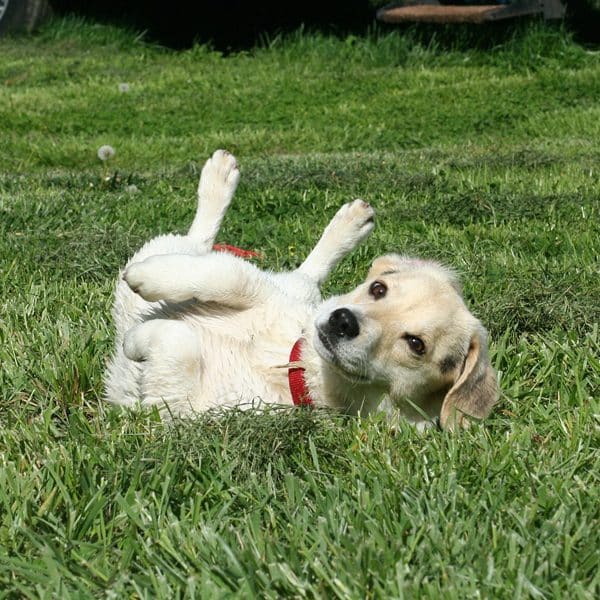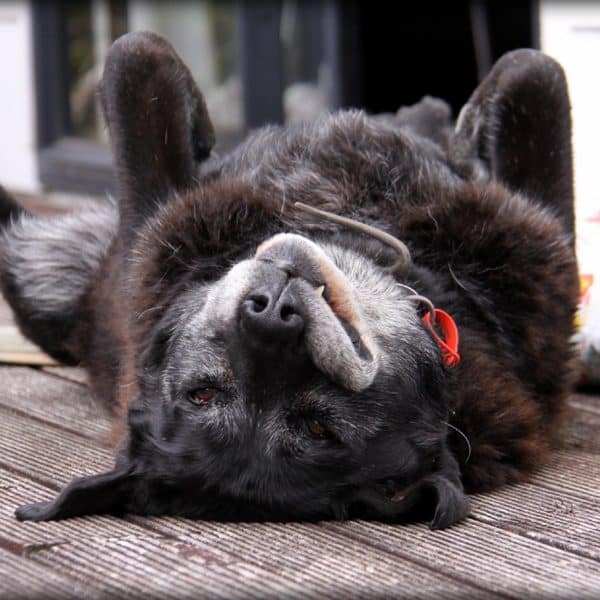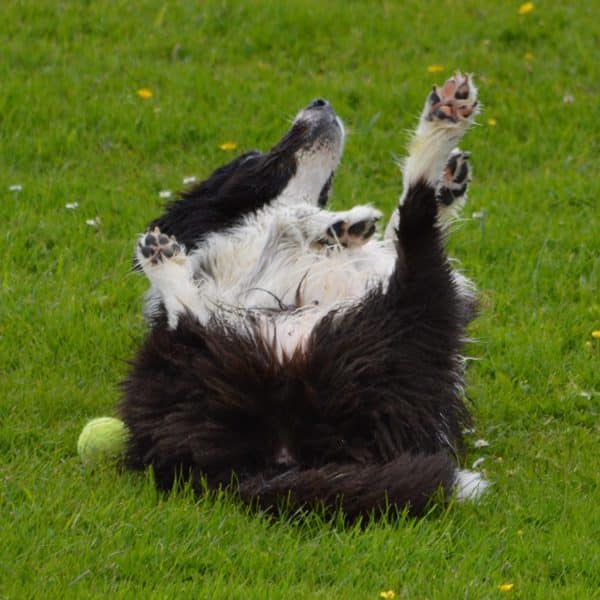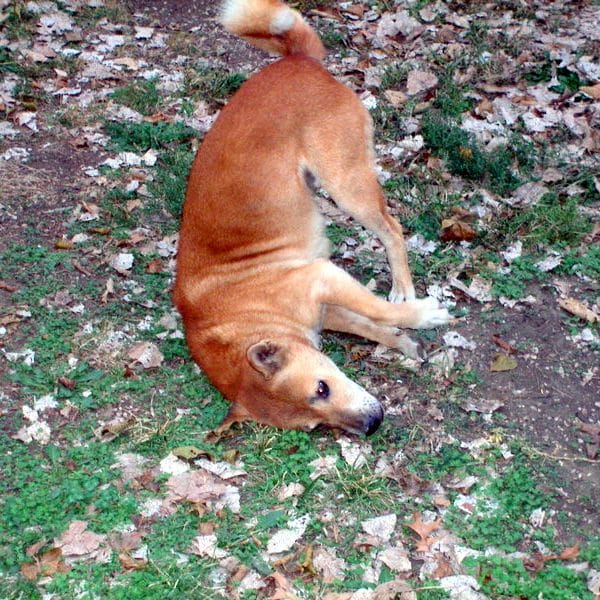I’ve got a buddy who’s really — and I mean really — into Brazilian Jiu-Jitsu. One of his mottos is “Live to Roll, Roll to Live.” As far as I know, there’s no branch of organized martial science devoted to canine grappling. At one time or another, we’ve all leaned in to pet our dogs, only to realize that they’ve been rolling around in some truly abhorrent substance, such as feces, urine, or decomposing flesh.
Why do dogs roll in things that smell bad?
We try not to think about it too much, but if there’s one thing a dog loves, it’s biological waste. It doesn’t even seem to matter whose body it came out of, nor, in a macabre twist, whose body it used to be. Dogs seem to enjoy investigating the offal produced by other creatures — including humans — even more than their own. There are a number of eternally recurring questions that dog owners ask related to fecal matters. I’ve actually lost count of how many times I’ve personally written about dogs’ preoccupation with dung. Here are just a few recent examples:
- Constipation in dogs
- Causes of abnormal dog stool
- Why do dogs eat poop?
- Why do dogs eat tampons?

This smelly dog loves rolling in poop. (Photo via Pixabay)
Each, I think you’ll agree, is more repulsive than the one before! Why are dogs so preoccupied with excrement and carrion? Here’s a scenario familiar to most of us: Your dog has just had a bath, or returned from the groomer. You go out for your walk together, and literally the first thing the dog does is angle their neck toward the ground and begin rolling around. Before you can even vocalize your displeasure or alarm, the dog returns to you, bearing the scent of something truly foul. Like the list above, let’s examine why our dogs roll around on their backs and what might be motivating them:
- Why do dogs roll in poop?
- Why do dogs roll in dead things?
Why do dogs roll in poop?
Dog rolling tends to happen with greater frequency and intensity outside of their own homes and yards. This is not necessarily because familiarity breeds contempt in dogs, or due to lack of interest in your laundry, but because new places have a superabundance of new smells, and metric tons of feces that simply aren’t available in and around the comfort of their native territory. My dog is a scenthound, so she is always on the prowl for fascinating new smells. During our walks, especially when we meander off the park’s established trails, my dog will flop over without warning on anything that catches her attention.

This senior dog has a proud history of rolling in things that stink. (Photo by Bill Harrison on Flickr)
An intriguing patch of grass, some pebbles on the lake shore, a seemingly random patch of dirt on the trail, or, in the fall, piles of rotting leaves or pine needles. In the course of researching, I discovered that there is nothing inherently fascinating about the medium itself. Be it an intriguing patch of grass, a seemingly random pile of leaves, pebbles on the lake shore, or even the face of a large rock, the material is incidental. It’s the fecal wonders that the terrain is concealing that draws them!
Whether it’s the small round- or oval-shaped pellets that deer or rabbit poop, the longer and more cylindrical scat that typifies the dung of dogs and foxes, the barely discernible droppings of rodents, or the white smears deposited by passing fowls, dogs have an uncanny ability to find and roll around in the ordure of their fellow creatures. Of course, dog owners find it horrifying and repulsive, but dogs seem to love it, especially after they’ve just had a bath!
Why do dogs roll in dead things?
If it’s not some random animal’s night soil, my own dog is also fond of locating and coating herself in the pure and pungent scent of rotting corpses. Since we hike near a lake, I often see Baby make that peculiar neck twist, putting first her face, then neck and body, into a recently deceased fish along the shore. It’s not just a spritz, either.

This dog has forgone fetch to roll in poop. (Photo via PublicDomainPictures)
If they’re not on a leash, where you could potentially pull them away, dogs will really go to town and make sure they’re fully coated in eau de charogne, or the smell of carrion. Poop is already an unaccountable scent preference; why would a dog want to expose their beautiful coat to the stench of death? And why on earth do they always go face first, just prior to putting their backs into it?
Scent rolling
The evolutionary throwback to wolf ancestors is a popular rationale for any number of domestic dog traits and behaviors. Everything from the floppy, perfunctory dew claws on a dog’s hind feet, to their penchant for eating grass, to howling has been explained away by reasoning that these are reminders of the dog’s early lupine heritage. Interestingly, dogs rolling in things that stink might be the one instance where the remote history of dog development plays a legitimate part.
Every reputable source I researched — from the late animal behaviorist Dr. Sophia Yin, to life-long student of dogs, Dr. Stanley Coren, to specialists at Idaho’s Wolf Education & Research Center — agreed that the act of dogs rolling in material humans find disgusting has its roots in wolf behaviors. The habit is referred to as “scent rolling,” and it performs a number of functions, including disguise.

This New Guinea Singing Dog probably smells like death. (Photo via Wikimedia Commons)
Covering themselves in the smell of feces or carrion is helpful when wolves are hunting prey. For hunting breeds, like my Bluetick Coonhound, cloaking their own native dog scent is an aid to tracking, pursuing, and capturing a target. Regardless of how foul humans find fresh dung or rotting meat, to animals, the smells of dung and death are reassuring and innocuous parts of daily life.
Sharing is caring!
Could there be a strangely endearing reason why dogs roll around in poop and corpses? Yes! While scent rolling is useful when wolves and dogs are tracking or hunting, it may also serve a communicative, social function. Living in packs, wolves not only roll in strange materials to hide themselves, but also to mark territory, leaving their own scent in places where members of rival packs might otherwise intrude.
Another possible function for canids is intelligence gathering for the benefit of the pack. For most domestic dogs, this seems an insufficient explanation. My Baby is an only dog, so it would seem that her scent rolling is either an individual aesthetic choice or that I am the pack that she intends to benefit. Throwing herself into a pile of poop or the desiccated remains of a woodland creature might be Baby’s way of sharing her amazing discoveries with me.
The post Live to Roll, Roll to Live: Why Do Dogs Roll in Poop? appeared first on Dogster.
No comments:
Post a Comment